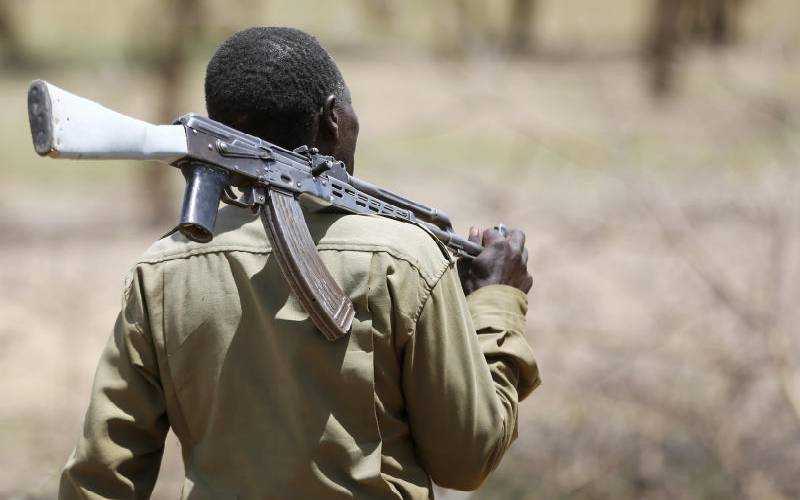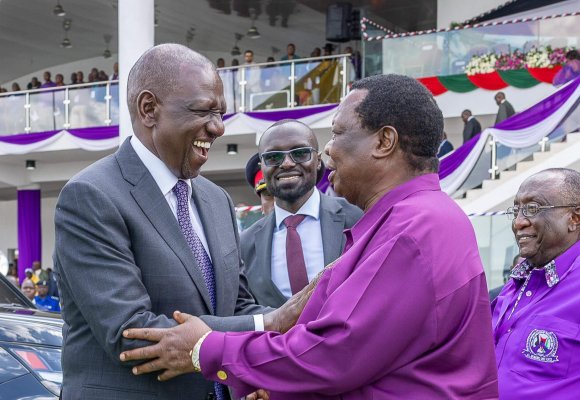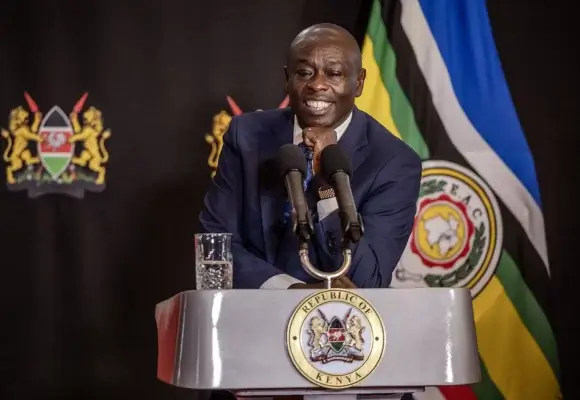|
LISTEN TO THIS THE AFRICANA VOICE ARTICLE NOW
Getting your Trinity Audio player ready...
|
Over the decades, banditry in the North Rift part of Kenya has been a menace, leaving a trail of blood in its wake.
Hundreds of herds of livestock have been stolen, leaving many people without a livelihood— hopeless, fearful, and impoverished.
In most pastoralist communities, cattle are a source of food, pride, prestige, and status, but over the decades, the same cattle seem to have become the cause of tribal conflict and death among tribes in the Rift Valley region.
For years the people of this region have conflicted with neighboring countries, including the Merille of Ethiopia, the Toposa along the South Sudan border, and Karamojong in Uganda. Still, it’s the internal conflict witnessed now that has forced the government to declare the issue a national emergency.
According to a report released on Monday, February 13, by the Cabinet Secretary for Interior— Prof Kithure Kindiki, at least 100 civilians and 16 police officers have been killed in the last six months.
“The murderous gangs have recently escalated terror on innocent Kenyans and law enforcement agencies and, in the process, burnt down schools, police vehicles, and other social amenities,” Kindiki said.
In response, President William Ruto ordered the National Police Service and the Kenya Defence Forces (KDF) to conduct a joint operation in Northern Kenya to weed out bandits and restore normalcy.
“We will use all means available to ensure we weed out bandits from the affected parts of the North Rift and other areas. My government will not entertain banditry,” said Ruto on Sunday, February 12, during an interdenominational prayer service in Nakuru.
Thus the president released the military and the police into the six Northern Rift Counties. The six, dubbed ‘disturbed’, include Elgeyo Marakwet, West Pokot, Baringo, Laikipia, Turkana, and Samburu.
This is after a three-day amnesty was extended to the residents of the counties to surrender illegal firearms.
“It’s not easy to steal 1000 cows without anybody noticing, which means the people of this region know these bandits. People must be sincere from the security officers, leaders in this area, the church leaders, and the community to continue promoting peace,” Bishop Luke Mwangi.
However, this is not the first time the government is taking strict measures against the bandits, yet they always seem to defy the orders issued and continue with attacks.
Former Rift Valley Regional Commissioner, and the current governor of Trans Nzoia, George Natembeya, recently revealed how he was forced to resign due to government frustration in dealing with cattle rustling.
Natembeya noted that officers from the region lack motivation and are often forced to collude with the bandits for food.
The governor called on the president to take swift measures and increase security forces in the affected areas, as the bandits have been highly enabled by the government’s lack of action against banditry.
Leaders in the region blame the government for the continued insecurity and perennial cattle rustling between different tribes.
Sotik member of parliament Francis Sigei said the government’s interference is putting a strain on the already worse situation among the communities.
Sigei said the government should involve the people in these communities when looking for a solution to end cattle rustling.
Loima member of Parliament Protus Ewesit has also blamed CS Kindiki for bypassing them when dealing with security issues in their constituencies and instead going to the governor, who is mostly unaware of what is happening in the constituencies. The legislator also raised the lack of enough police officers, which he said has contributed to the areas’ perennial insecurity.
According to the MP, some police stations have less than ten police officers who are supposed to guard an area with over 10 000 people, and they end up being overpowered whenever an attack occurs. The police stations are also scattered within a radius of 100km, he said.
Ewesit urged the president to take the matter into his hands and stop delegating an issue that has been a thorn for decades.
“The issue of cattle rustling is now like terrorism, and it’s high time the president takes this matter seriously and solves it once and for all. We are challenging the president to visit this area himself to have a clear picture of what is happening,” said MP Ewesit in an interview with The Africana Voice.
The MP said the issue had been made worse because the bandits had started killing women and young children, which had never happened in past decades. He also accused some leaders of sponsoring cattle rustling in the areas and hiding in the government for protection.
Tiaty Member of Parliament William Kamket is one of the leaders who have been highly mentioned in the involvement of cattle rustling, although the MP has denied the claims.
The MP is on record making provoking statements on different occasions and has been arrested for his remarks.
Kamket, a staunch supporter of Raila Odinga— the Azimio La Umoja coalition leader, is said to have changed allegiance when the new government took over so that he could get protection from the ruling government.
Turkana leaders have also been calling on the government to set up a military base in the county to help reduce the insecurity.
Bishop Luke Mwangi of Jesus Breakthrough Assembly has called on the people of the affected region to own up and be sincere in uprooting the bandits.
“It’s not easy to steal 1000 cows without anybody noticing, which means the people of this region know these bandits. People must be sincere from the security officers, leaders in this area, the church leaders, and the community to continue promoting peace,” the Bishop said.
Governor Natembeya on Bandit menace in the North Rift





























LEAVE A COMMENT
You must be logged in to post a comment.